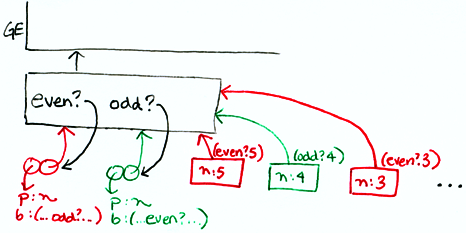recitation 21: more evaluator practice
--------------------------------------------------------------------
suppose we change the call in m-apply from:
(extend-environment (procedure-parameters procedure)
arguments
(procedure-environment procedure))
to:
(extend-environment (procedure-parameters procedure)
arguments
the-global-environment)
* does this change how we draw environment diagrams? how?
yes, now all frames will hang directly from the global environment.
the environment pointer of the procedure is ignored.
* write the simplest expression (or set of expressions) you can, which
evaluate to a different value with the original m-apply versus the
modified m-apply.
(define x 5)
((lambda (x) x) 2)
original m-apply --> 2
modified m-apply --> 5
NOTE: the value of the sugared version of this expression:
(let ((x 2)) x)
will depend on the implementation of let in the evaluator. (why?)
--------------------------------------------------------------------
(incr! <var> <exp>)
(define x 10)
(incr! x 3)
x --> 13
* change the evaluator to add incr!
* now add decr! does it have to be a special form?
yes decr! must be a special form. we can't let the application
clause handle this expression, because we don't want to evaluate <var>.
* make a (general) list of the things that need to be changed/added
when you extend the evaluator to add a new special form.
- write expression detector, accessor & constructor functions
- write necessary helper functions
- add clause to m-eval
- modify m-apply or other parts of the evaluator, as necessary
--------------------------------------------------------------------
practice using the "named-let" special form:
(let <var> <bindings> <body>)
The <bindings> and <body> are just as in ordinary let, except that
<var> is bound within <body> to a procedure whose body is <body> and
whose parameters are the variables in the <bindings>. Thus, one can
repeatedly execute the <body> by invoking the procedure named <var>.
(let foo ((x 5))
(display x)
(if (< x 1)
'done
(foo (- x 1))))
* draw an environment diagram for this example. what variables does
the procedure foo need access to?

NOTE: this is one possible solution. there are other variations
that also correctly implement the specified semantics.
* how would you use named-let to iteratively reverse a list?
(hint: use 2 variables in the <bindings>)
(let reverse ((rest '(1 2 3 4))
(answer '()))
(if (null? rest)
answer
(reverse (cdr rest) (cons (car rest) answer))))
* you're asked to add named-let to the evaluator for project 5...
--------------------------------------------------------------------
practice using the "letrec" special form:
(letrec ((<var1> <exp1>) (<var2> <exp2>) ... ) <body>)
the <var>s are bound in a new frame to (initially) undefined values.
the <exp>s are evaluated in the resulting environment (in unspecified
order), and bound to the corresponding <var>. the <body> is evaluated
in the resulting environment, and the value of the last expression in
<body> is returned. each binding of a <var> has the entire `letrec'
expression as its region, making it possible to define mutually
recursive procedures.
* what does it mean to say that m-eval and m-apply are
"mutually-recursive procedures"?
even? calls odd?, and odd? calls even? the environment
for each procedure must contain the definition for the other.
One restriction on "letrec" is very important: it must be possible to
evaluate each <exp> without assigning or referring to the value of any
<var>. If this restriction is violated, then it is an error. The
restriction is necessary because Scheme passes arguments by value
rather than by name. In the most common uses of `letrec', all the
<exp>s are lambda expressions and the restriction is satisfied
automatically.
(letrec ((even?
(lambda (n)
(if (zero? n)
#t
(odd? (- n 1)))))
(odd?
(lambda (n)
(if (zero? n)
#f
(even? (- n 1))))))
(even? 5))
* draw an environment diagram for this example. what variables do
the procedures even? and odd? need access to?

* use letrec to create a toy expression with 3 mutually-recursive
procedures. show that your expression does not result in an
infinite loop.
* you're asked to add letrec to the evaluator for project 5...
--------------------------------------------------------------------
* can you rewrite (desugar) a "named-let" using "let"?
* can you rewrite (desugar) a "named-let" using "letrec"?
--------------------------------------------------------------------
(dolist (<var> <lst>) <body>)
<var> is bound to each element in <lst> sequentially and <body> is
executed once for each binding. the expression returns the value of
the last expression in body for the binding of <var> to the last
element of <lst>.
(dolist (x '(1 2 3 4)) (display (* x x)))
* is dolist a special form? why or why not?
* change the evaluator to add dolist
--------------------------------------------------------------------

